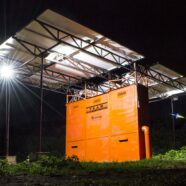
Kenya-based business SteamaCo is harnessing the disruptive power of mobile to bring affordable access to electricity to rural, off-grid communities. Its smart technology allows solar micro-grid owners to monitor the performance of micro-grids remotely and capture consumer payments via mobile money platforms, thereby overcoming the traditional challenges of keeping grids working reliably and profitably. This simple but fundamental transition stands to make investment in solar micro-grids a truly compelling prospect, bringing electricity to millions and empowering local entrepreneurs to thrive.
SteamaCo’s transformative approach has been recognised at a global level by clean energy charity Ashden. The company has just won the Ashden International Gold Award and Business Innovation Award, and has ambitious plans to scale up.
Tapping into the mobile revolution
Speaking at this month’s ‘Business of Energy’ event in London, SteamaCo co-founder Dr Sam Duby said SteamaCo was ‘standing on the shoulders of giants’ by piggybacking on the explosive popularity of mobile money platforms in Kenya. Some 25% of Kenya’s GDP now flows through M-PESA, the country’s flagship and ubiquitous mobile money platform. Meanwhile, mobile internet use in Africa is predicted to grow at double the rate of the rest of the world towards 2019.
“The world is getting smarter and we’re just one of a number of companies tapping into this growing ‘internetisation’ to bring change to people’s lives,” enthused Duby. “Developing communities have traditionally been viewed as too poor to use sophisticated energy services, but we aim to show that is simply not the case.”
Referring to smart thermostat start-up Nest, now owned by Google, he said: “We call ourselves ‘Nest for the rest’. We’re using the same type of technology and the same intelligent processes to catalyse major social and environmental benefits.”
Having experienced the challenges of running micro-grids – small-scale power grids that can operate independently or in conjunction with a mains electrical grid – firsthand, Duby and co-founder Harrison Leaf now focus entirely on developing smart ‘tools’ for grid owners to operate successfully. And the time is right for remote electricity monitoring technology, Duby believes, as solar energy becomes more affordable and a rapidly industrialising continent seeks more power, against a backdrop of insufficient energy infrastructure.
Grid owners and operators install SteamaCo’s hardware at their power stations and monitor the technical and financial performance of grids remotely – and in real time – via cloud-based software. They can troubleshoot and address problems, such as a dip in battery voltage, before they become serious, identify spare capacity that could be directed to other uses, like water-pumping, and check each customer’s power usage against their remaining balance.
Meanwhile, customers get flexible access to electricity – they top up their credit and check their balance, as they would a pay-as-you-go phone. Importantly, all data, including notifications to top up, is sent by SMS messages, making it possible to operate in the most remote, rural regions.
Having won its first customer in 2013, SteamaCo is now supporting 30 grids (26 in Kenya and four in Tanzania, Benin and Nepal) that provide a total of 120kW of power to 1,000 homes and small businesses. Among the owners of the first grids are energy heavyweights E.ON and PowerGen. It plans to expand further in Kenya and beyond.
So why did the Ashden judges consider the innovation as game-changing?
Removing the barriers to investment
“SteamaCo’s technology stands to tip the balance in expanding access to electricity by making micro-grids an investable proposition,” explains Dr Anne Wheldon, renewable energy expert and Ashden judge. “Investors can see there’s a clear mechanism in place to manage grid maintenance and capture payments transparently.”
Additionally, the flexibility of the SteamaCo platform means it could even be used to connect people to the mains grid. Should electricity regulators approve the idea, a micro-grid using SteamaCo technology could buy a connection from the mains grid, and share the cost with its users. With the cost of a single grid connection in Kenya typically $700 – a figure far beyond the means of most people – this could make electricity affordable for millions of families. A connection to SteamaCo’s micro-grid currently costs around $10.
Elsewhere, the company’s technology is being used in Nepal and Kenya to manage village water grids, as well as by industrial players keen to monitor and audit energy use remotely. Among other potential applications, it could connect with weather forecasting apps to help manage irrigation on farms.
Empowering families and entrepreneurs
“Affordability is crucial to expanding access to electricity in developing communities, and doing so in an equitable way,” explains Wheldon. “Paying per unit of electricity used means people can buy power in line with their earning patterns and domestic needs. It makes electricity for the poorest possible.”
And with 1.2bn people worldwide lacking access to electricity, there is real potential here for technologies of this kind to help alleviate poverty and support sustainable development. What’s more, gaining access to a reliable source of energy stands to unleash a wave of entrepreneurial activity. SteamaCo has already seen evidence of this in Kenya, where people have begun all kinds of businesses since connecting to their local micro-grid. Hairdressing salons, water pumping stations and mobile phone charging kiosks are thriving, says Duby, while in another example, a technician is offering radio repair services, saving people a 200km round trip to the nearest town.
This is just the beginning. With effective policy-making and further investment, companies like SteamaCo could make affordable, sustainable energy a reality – for all.
This article was originally published on the Guardian Sustainable Business site.

